Cat hookworms, though often overlooked, can have profound implications for the health of feline companions. The intricate web of transmission, symptoms, and treatment options surrounding these parasites demands a closer look.
By unraveling the complexities of hookworm infections in cats, a clearer path to detection, treatment, and prevention emerges.
Stay tuned as we navigate the realm of cat hookworms, revealing crucial insights that every cat owner should be aware of in order to safeguard their beloved pets.
Key Takeaways
- Hookworms in cats can be detected early by recognizing symptoms like dark diarrhea and weakness.
- Treatment for hookworms involves vet-prescribed deworming medication to eliminate the parasites.
- Prevent hookworm infections in cats through indoor living, regular fecal testing, and parasite preventatives.
- Understanding the transmission, symptoms, treatment, and prevention is vital in managing hookworms in cats.
Understanding Cat Hookworm Infections
Cat hookworm infections are a common parasitic concern that can affect feline health and potentially pose risks to human health due to their zoonotic nature. These infections are caused by Ancylostoma tubaeforme and Ancylostoma braziliense hookworm species in cats.
The hookworm larvae can penetrate the cat's skin or be ingested, leading to various symptoms such as dark diarrhea, weakness, pale gums, coughing, and skin lesions. These parasites feed on blood, which can result in anemia in severe cases.
Prompt detection and treatment are crucial to prevent further complications. Regular fecal testing, maintaining a clean environment, and administering preventive measures recommended by a veterinarian are essential steps to safeguard both feline and human health from the harmful effects of cat hookworm infections.
Zoonotic Nature of Hookworms
The potential for cross-species transmission of hookworm infections underscores the paramount importance of understanding the zoonotic nature of these parasitic organisms. To grasp the significance of zoonotic hookworm infections, consider the following:
- Cross-species Transmission: Hookworms can easily transfer between cats, dogs, and humans, highlighting the interconnectedness of these infections.
- Skin Infections in Humans: While cats and dogs may not always affect humans' digestive tracts, hookworms can lead to skin infections when transmitted to humans.
- Preventive Measures: Implementing preventive measures, such as regular deworming for pets and maintaining good hygiene practices, is crucial in minimizing the risk of zoonotic hookworm infections.
Symptoms and Transmission Routes
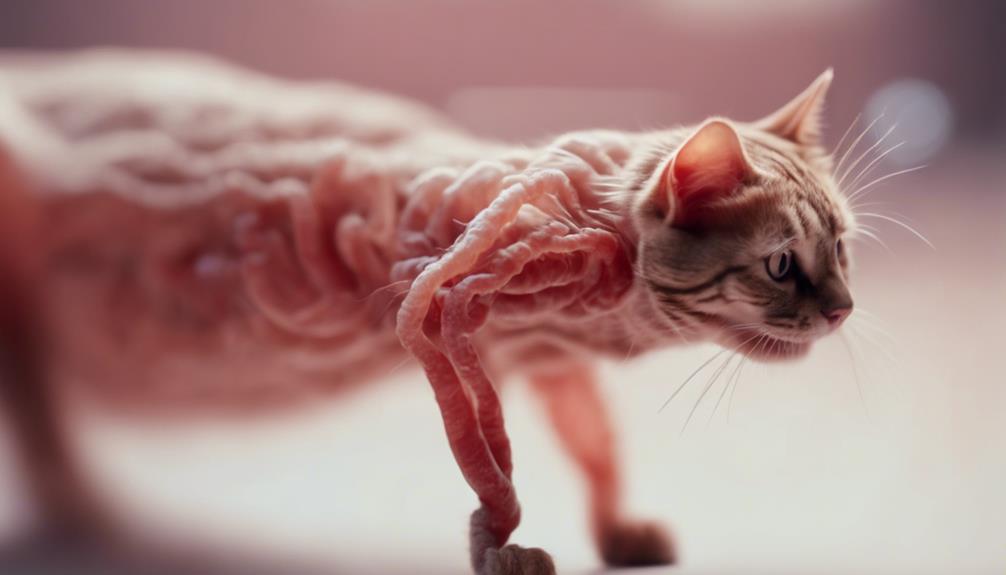
Understanding the symptoms and transmission routes of hookworm infections in cats is crucial for timely detection and effective management of the disease. Cats can acquire hookworms through various routes, including ingestion of larvae, contact with contaminated fecal matter, or even through coughing.
Female hookworms lay eggs that can survive in the environment, contributing to the spread of infection. Symptoms of hookworm infection in cats may include dark diarrhea, weakness, pale gums, coughing, and skin lesions. Severe infestations can result in anemia and other medical complications.
Early detection of these symptoms is essential for prompt treatment. Therefore, being aware of the transmission routes and recognizing the associated symptoms can help in preventing the progression of hookworm infections in cats.
Impact of Hookworm Infections
The impact of hookworm infections on feline health encompasses a range of potential consequences that can significantly compromise the wellbeing of affected cats. These consequences include:
- Anemia: Hookworms feed on blood, leading to blood loss and potentially severe anemia in infected cats.
- Weakness and Lethargy: Due to the blood-sucking nature of hookworms, affected cats may experience weakness, lethargy, and decreased activity levels.
- Skin Lesions and Irritation: Cats with hookworm infections may develop skin lesions and experience skin irritation due to the parasites' burrowing activities, causing discomfort and potential secondary infections.
Importance of Early Detection
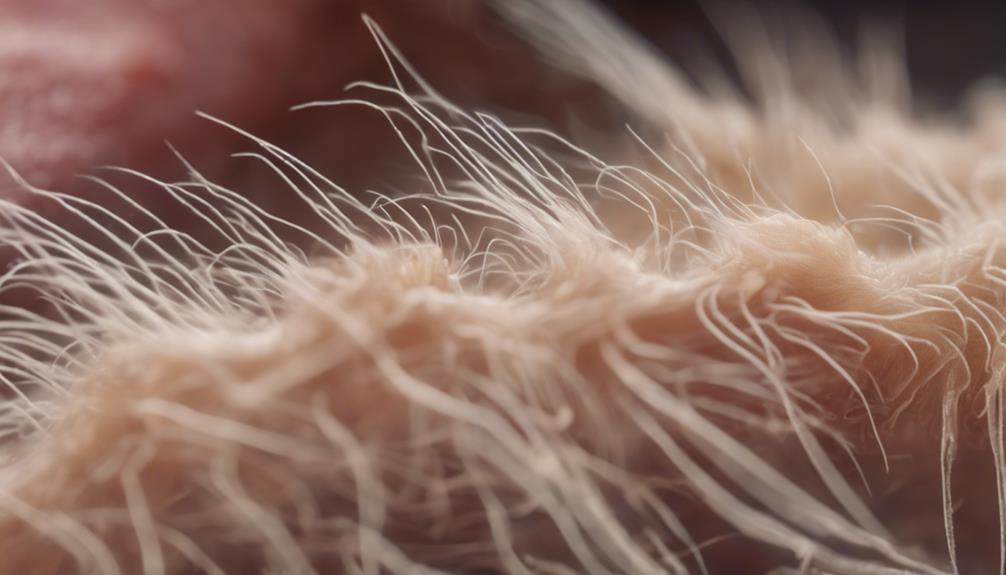
Early detection plays a crucial role in safeguarding the health and well-being of cats at risk of hookworm infections. Timely identification of symptoms can lead to prompt treatment, preventing severe complications such as anemia and organ damage. Regular monitoring and early intervention are key to managing hookworm infestations effectively. Here is a table highlighting the importance of early detection:
| Benefits of Early Detection | Signs to Watch For | Action Steps |
|---|---|---|
| Allows prompt treatment | Dark diarrhea | Consult a vet |
| Prevents severe complications | Weakness | Provide a fresh fecal sample |
| Improves overall prognosis | Pale gums | Administer deworming medicine |
Consulting a Veterinary Professional
When facing potential hookworm infections in cats, seeking guidance from a veterinary professional is essential for accurate diagnosis and appropriate treatment. Consulting a vet ensures the health and well-being of your feline companion. Here are three key reasons why veterinary guidance is crucial:
- Accurate Diagnosis: Vets can perform specific tests to confirm hookworm infections and rule out other potential health issues.
- Tailored Treatment Plan: Veterinarians can recommend the most effective deworming medications and treatment protocols based on the severity of the infection.
- Preventive Advice: Vets can provide valuable insights on preventing future hookworm infestations through proper hygiene, regular check-ups, and preventative measures.
Deworming Treatment for Cats

Effective deworming treatment is essential for managing hookworm infections in cats. Deworming medicine prescribed by a veterinarian is crucial to eliminate adult and larval hookworms. Multiple treatments may be required to completely eradicate the parasites. Severe cases might necessitate hospitalization and blood transfusions. It is important to note that home remedies are not effective for treating hookworm infections in cats; only vet-prescribed treatments should be used.
Deworming Treatment Table:
| Treatment Type | Description | Frequency |
|---|---|---|
| Oral Medication | Administered by mouth | Typically once a day for a specified duration |
| Topical Solutions | Applied on the skin | Usually every 30 days for prevention |
| Injectable Medication | Given via injection | Depending on severity, may be administered as a one-time or multiple doses |
Management of Severe Cases
In cases of severe hookworm infections in cats, advanced veterinary care and intensive treatment protocols are essential to address the potential complications and health risks associated with the parasitic infestation. When managing severe cases of hookworm infections in cats, the following steps are crucial:
- Blood Transfusions: Severe hookworm infestations can lead to anemia due to blood loss. In such cases, blood transfusions may be necessary to stabilize the cat's condition and improve their red blood cell count.
- Fluid Therapy: Dehydration is a common complication of severe hookworm infections. Intravenous fluid therapy helps in restoring hydration levels and maintaining the cat's overall health.
- Monitoring and Supportive Care: Close monitoring of the cat's vital signs, blood parameters, and overall condition is essential. Providing supportive care such as nutritional support and medications to manage symptoms can aid in the cat's recovery process.
Hospitalization and Care
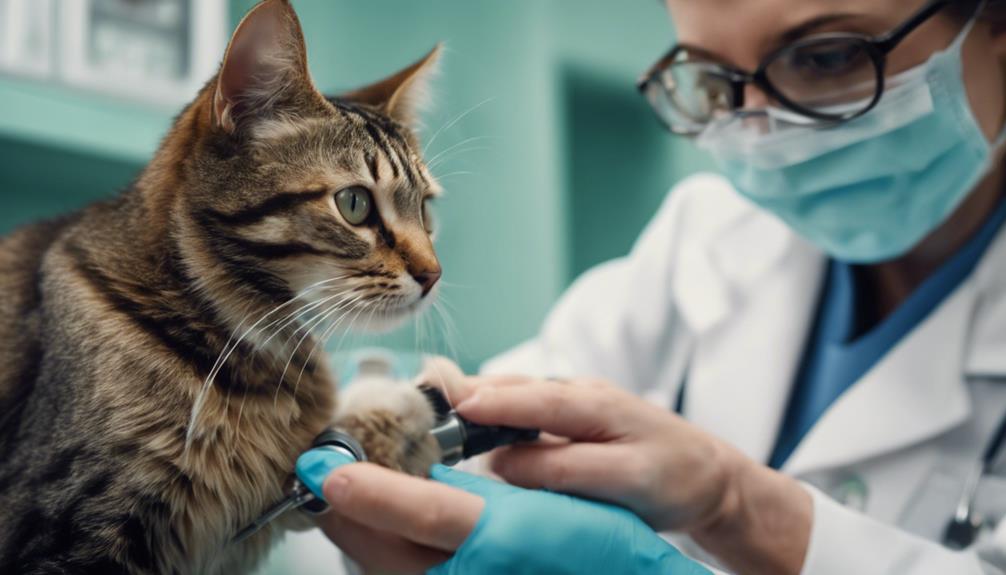
For cats with severe hookworm infections requiring intensive medical intervention, hospitalization is often necessary to provide round-the-clock care and specialized treatment. In the hospital setting, veterinarians can closely monitor the cat's condition, administer intravenous fluids to combat dehydration caused by blood loss, and offer supportive care to manage symptoms such as anemia and weakness.
Additionally, hospitalized cats may require blood transfusions to replenish red blood cells and improve their overall health. Veterinary professionals will tailor treatment plans to each cat's specific needs, ensuring a comprehensive approach to combat the hookworm infection effectively.
Hospitalization offers a controlled environment where cats can receive the necessary care and medical attention to aid in their recovery from severe hookworm infestations.
Effective Prevention Strategies
Implementing proactive measures is key to safeguarding cats against hookworm infections and other parasitic threats. To effectively prevent hookworm infestations in cats, consider the following strategies:
- Regular Preventative Medication: Administer monthly preventatives prescribed by a veterinarian to protect your cat from hookworms, fleas, ticks, and heartworms.
- Maintain Hygienic Environments: Clean your cat's living spaces regularly, promptly remove feces, and ensure a clean environment to minimize the risk of parasite transmission.
- Consult with a Veterinarian: Regularly consult with a veterinarian to discuss parasite preventatives tailored to your cat's specific needs based on factors such as age, weight, and lifestyle. Regular fecal testing can also help detect any potential parasite issues early on.
Indoor Cat Care Practices
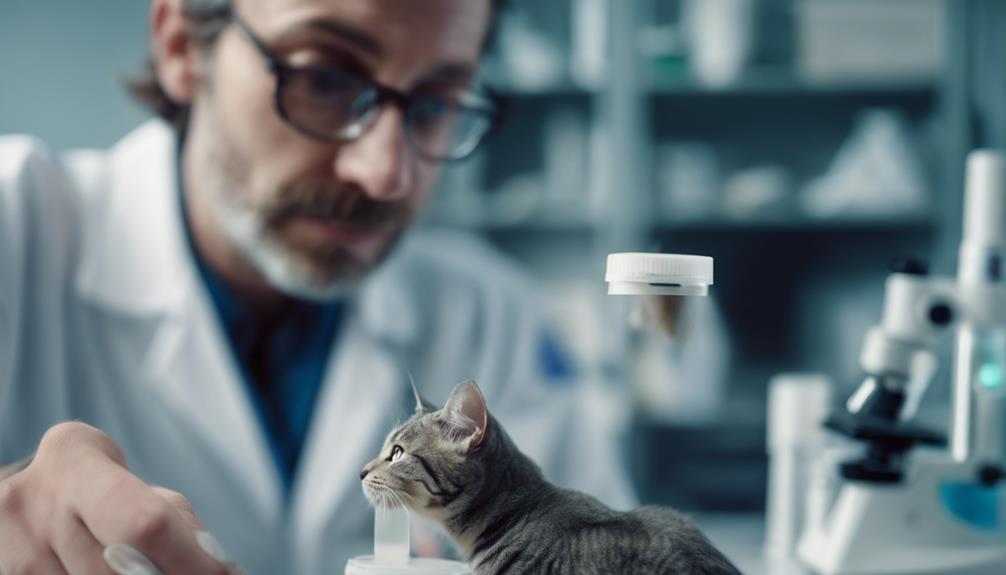
Utilizing appropriate environmental enrichment is essential for maintaining the health and well-being of indoor cats. Indoor cat care practices involve providing mental stimulation, physical activity, and safe spaces for cats to thrive. Consider incorporating the following enrichment activities into your cat's daily routine:
| Enrichment Activity | Description |
|---|---|
| Interactive Toys | Engage your cat's hunting instincts. |
| Cat Trees | Provide climbing and scratching areas. |
| Puzzle Feeders | Stimulate mental activity during meals. |
Monthly Preventatives for Cats
To safeguard cats from common parasites like hookworms, fleas, ticks, and heartworms, monthly preventatives play a crucial role in maintaining their overall health and well-being. These preventatives help in controlling and preventing infestations, ensuring your feline companion stays healthy and parasite-free. Here are three key points to consider when using monthly preventatives for cats:
- Consistency: Administer the preventative on schedule every month to ensure continuous protection.
- Comprehensive Coverage: Choose a preventative that targets multiple parasites to provide broad-spectrum protection.
- Veterinary Guidance: Consult with your vet to select the most suitable preventative based on your cat's specific needs and lifestyle.
Vital Fecal Testing
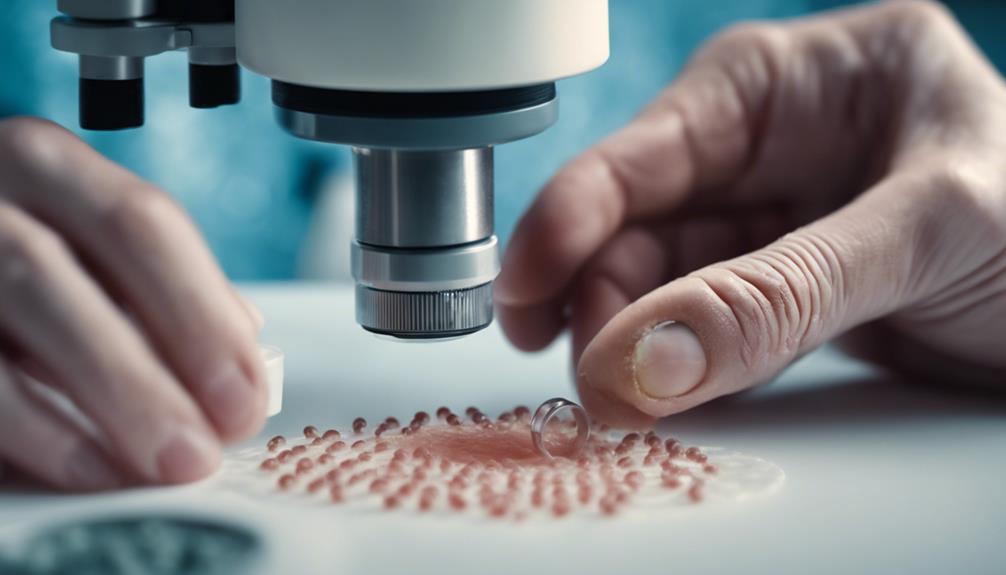
Regular fecal testing is essential for monitoring and managing parasite infestations in cats. By analyzing a cat's fecal sample, veterinarians can identify the presence of hookworms and other parasites early on. This diagnostic tool helps in determining the appropriate treatment plan to combat the infestation effectively.
Additionally, fecal testing aids in assessing the effectiveness of deworming medications post-treatment, ensuring that the parasites have been successfully eradicated. Routine fecal examinations are recommended, especially for outdoor cats or those with a history of gastrointestinal issues.
Timely detection through fecal testing can prevent severe complications associated with hookworm infections, safeguarding the health and well-being of feline companions.
Maintaining Clean Environments
Maintaining a hygienic environment is crucial in preventing the spread of parasites and ensuring the overall well-being of feline companions. To keep your cat safe from hookworms and other parasites, follow these essential steps:
- Regular Cleaning:
- Clean litter boxes daily and dispose of feces promptly.
- Vacuum and mop floors regularly to remove any parasite eggs or larvae.
- Wash your cat's bedding and toys frequently to prevent reinfestation.
- Outdoor Control:
- Limit your cat's outdoor access to reduce exposure to contaminated soil.
- Remove any feces from your yard to prevent environmental contamination.
- Consider creating a designated outdoor area with clean soil for your cat.
- Environmental Treatments:
- Use pet-safe disinfectants to clean surfaces where your cat spends time.
- Consider using environmental sprays to repel parasites in your home.
- Consult your vet for recommendations on effective environmental control products.
Personalized Parasite Preventatives

Personalized parasite preventatives tailored to your cat's specific needs are essential for effective parasite control and safeguarding their health. By consulting with a veterinarian, you can determine the most suitable preventative measures based on factors like your cat's age, weight, and lifestyle. These personalized preventatives can help protect your feline companion from a range of parasites, including hookworms, fleas, ticks, and heartworms. To give you a clearer picture, here is a table outlining different types of personalized parasite preventatives:
| Type of Preventative | Administration | Frequency | Benefits |
|---|---|---|---|
| Topical Treatments | Applied on skin | Monthly | Protects against fleas and ticks |
| Oral Medications | Ingested | Monthly | Prevents heartworm disease |
| Collars | Worn around neck | Lasts several months | Repels fleas and ticks effectively |
Frequently Asked Questions
Can Humans Get Hookworms From Their Cats?
Yes, humans can contract hookworms from cats. The disease is zoonotic and can spread between animals and humans. While cats' hookworms are less likely to affect human digestive tracts, skin infections from the parasite are possible.
Are There Any Natural Remedies or Home Treatments for Cat Hookworm Infections?
Natural remedies or home treatments for cat hookworm infections are not recommended. Consulting a vet for proper diagnosis and prescribed deworming medication is crucial. Home remedies may be ineffective, and prompt veterinary care is essential for your cat's health.
How Long Does It Take for a Cat to Recover From a Severe Hookworm Infestation?
Recovery time for a severe hookworm infestation in cats varies based on individual health, treatment effectiveness, and supportive care. While some cats may show improvement within weeks, others may require longer recovery periods under veterinary supervision.
Can Outdoor Cats Be Completely Protected From Hookworm Infections?
Outdoor cats can face challenges in avoiding hookworm infections due to exposure to contaminated environments. While preventive measures like monthly medications and regular vet check-ups can reduce risks, complete protection may be challenging to achieve in outdoor settings.
Are There Any Alternative Methods to Prevent Hookworm Infections in Cats Other Than Monthly Preventatives?
Alternative methods to prevent hookworm infections in cats beyond monthly preventatives include maintaining a clean environment, practicing good hygiene, and minimizing outdoor exposure. Regular vet check-ups, fecal testing, and tailored preventive measures based on individual cat characteristics are essential.
Can Hookworms and Fleas in Cats Be Prevented with Similar Methods?
Prevent indoor cat fleas by using similar methods to prevent hookworms. Keep your cat’s environment clean and treat them with flea and hookworm preventatives. Regularly vacuuming and washing bedding can help control flea populations, while administering preventive medication can keep hookworms at bay.
Conclusion
In conclusion, cat hookworm infections present a significant health concern for both felines and their human caregivers. Understanding the transmission methods, symptoms, and treatment options is crucial for safeguarding the well-being of cats.
By staying informed, utilizing monthly preventatives, conducting vital fecal testing, and maintaining clean environments, pet owners can effectively combat the insidious grasp of hookworms on their beloved feline companions.
Stay vigilant and proactive in protecting your cats from this parasitic affliction.




